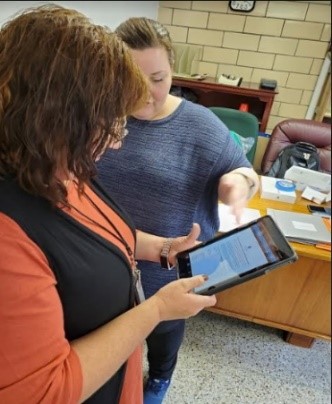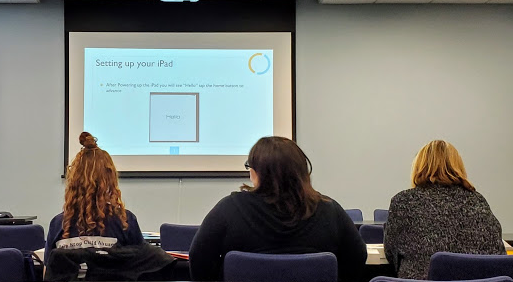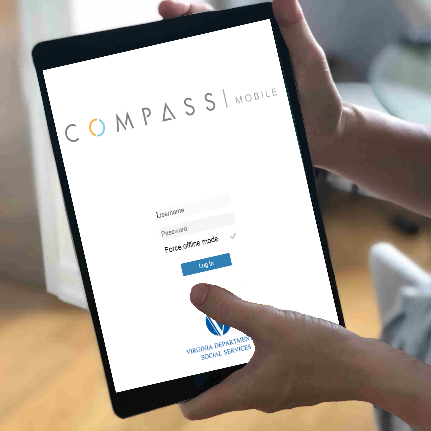Virginia Progress Update - The Timely Implementation of a Technology Solution
The pandemic is pushing the U.S. workforce to adapt and seek mobile solutions to carry out key tasks. Virginia’s child welfare workforce strengthening effort, supported by the Quality Improvement Center for Workforce Development (QIC-WD), includes a transcription service and a mobile solution (an application or app) on iPads to help the workforce manage their administrative and family engagement tasks out of the office. The effort began in 2017 but demand has been heightened by the pandemic. This post summarizes what the Virginia Department of Social Services (VDSS) has accomplished and learned as they roll out new technology to thousands of frontline workers across their locally-administered system encompassing 120 local agencies implementing the advances in the state.
Surveys of child welfare workers in Virginia emphasized the need for “a mobile solution” that would allow them to capture their case notes real time data including the stories and images of the children they serve. VDSS, in partnership with the QIC-WD, embraced implementation science to guide their rollout. One of their first steps was to develop an Implementation Council which includes local frontline workers, supervisors, directors, and regional and state staff. A key task of the Council is to vet communication strategies. VDSS communicated with staff (frontline workers, supervisors, managers) often and in multiple ways (written, face-to-face, infomercials) to prepare the workforce for the mobile solution, i.e., COMPASS | Mobile. Surveys were used throughout the early implementation phase to ensure communications were effective and that the staff knew their input was being received. Other strategies to support early implementation included:
- Functional Design Documents – Guidance documents to support using the application, COMPASS | Mobile.
- User Acceptance Testing - A group of workers participated in the testing of the application and provided immediate feedback on its functionality.
- Rapid Response Teams – Teams, organized by job function (e. g, director, supervisor, foster care, on-going, protective), completed surveys at key decision points to guide development.
These tools allow the team to get immediate feedback and make changes for an agile approach. For example, a Rapid Response Team survey was sent to frontline workers asking how many days of contacts they would want at their fingertips on COMPASS | Mobile. The response was 90 days. That direct feedback was included in the development of the app.
The first pilot workshop was rolled out in September 2019, after a year of intensive planning and developing the app. The workshop, also referred to as a lab, covered the technical pieces of how to use the application and included a discussion of how the tool can benefit the children, families, and workers in Virginia. Prior to attending a lab, attendees completed two eLearning courses and worked with their supervisor to prepare for implementation of the mobile solution. These prerequisites provided an opportunity for those unfamiliar with an Apple iPad to have an introduction to its basic functions prior to participating in the COMPASS | Mobile training. From October 7, to the end of February 2020, more than 1,500 child welfare workers and supervisors were trained, and more than 130 workshops were conducted. Immediate feedback was overwhelmingly positive, including sentiments like the app is “helpful,” “practical,” and “easy,” and statements like: “This is going help navigate faster in [the] field and communicate in real time with supervisor - less stress.” There was some resistance to the mobile solution, but the VDSS’ change management and capacity building team were persistent and worked to identify and overcome the challenges posed in some locations.
The COVID-19 pandemic changed the way everyone worked beginning in March 2020 and VDSS (like other large employers) had to pivot quickly. Staff had iPads to use the mobile app. VDSS added a “COVID-19 Resources” icon to the app which allows workers to access critical information and announcements. For some workers, the iPad was their sole source for access to case information. This innovative technology provided them access during the gap between agencies closing and Virginia loaning 1,000 laptops with a Virtual Private Network (VPN) to workers. When federal guidance permitted child welfare workers to conduct visits virtually, VDSS selected and purchased doxy.me so that staff could have virtual access to meet the federal face-to-face visit requirements, while ensuring the safety of the workforce.
The mobile solution continues to be implemented and studied, yet the following implementation lessons have been learned by VDSS (through rapid response surveys and input from the Implementation Council):
- Frontline workers need to be involved throughout the planning and early implementation process. Although the intervention involved technology, the approach to product development and implementation was human-centered.
- Change management was crucial to preparing the workforce for the mobile app.
- Communications must be intentional and layered to be effective. In other words, you need to share information often and in multiple ways to get your message across.
- Capacity building workshop labs functioned best with two to three trainers and real time technical support from a virtual team.
In addition, preliminary results from a diary study conducted by the QIC-WD include:
- Compared to non-users, COMPASS | Mobile users were significantly: more grateful towards the department; less concerned about the iPads being a barrier to engagement; more positive about iPads increasing their efficiency, reducing documentation time, freeing time for other tasks, and providing support for their work. Further, job satisfaction was significantly correlated with gratitude for the iPads.
- Almost 40% of staff using the COMPASS | Mobile indicated time savings related to contact documentation.
VDSS continues to introduce more workers to the mobile solution and enhance its functionality. For example, VDSS has already launched new features: an audio app, family messaging, and check-in. Next phases of the app will include: structured decision-making tools and a genogram feature. The QIC-WD is examining the impact of the transcription and mobile app on worker retention, a variety of shorter-term outcomes related to employee satisfaction, and longer-term impacts on child and family outcomes. New VDSS employees are being trained in COMPASS | Mobile as they onboard with their local agencies and the study will continue through 2021.


